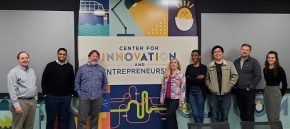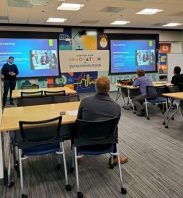
Seven of nine participants share customer discovery insights as I-Corps “Spring 2022 Super Regional Cohort” ends
 By Tom Ballard, Chief Alliance Officer, PYA
By Tom Ballard, Chief Alliance Officer, PYA
Yesterday was the finale for the “Spring 2022 Super Regional Cohort” of the National Science Foundation (NSF)-funded I-Corps South initiative. It also marked the end of the University of Tennessee’s (UT) five-year arrangement under a regional grant that is administered through the Georgia Institute of Technology.
What always attracts us to these concluding sessions are the insights that participants share after conducting their all-important customer discovery interviews, and yesterday’s nearly two-hour meeting once again did not disappoint. Whether it was Forrest Shriver of Sentinel Devices who itemized on a set  of slides 19 “learnings” from 21 interviews or Jhana Porter of Fractal who reviewed her interviews without any slides, it was obvious that the experience was beneficial to the participants who shared the knowledge they gained. Seven of the nine who began the program at the end of March (see initial teknovation.biz article here) shared their findings yesterday, and most did so in-person as noted in the picture on the right.
of slides 19 “learnings” from 21 interviews or Jhana Porter of Fractal who reviewed her interviews without any slides, it was obvious that the experience was beneficial to the participants who shared the knowledge they gained. Seven of the nine who began the program at the end of March (see initial teknovation.biz article here) shared their findings yesterday, and most did so in-person as noted in the picture on the right.
Hosted for the first time by the Center for Innovation and Entrepreneurship at UT Chattanooga (UTC), the I-Corps South series is a collaboration between UT, Knoxville’s Haslam College of Business and its Anderson Center for Entrepreneurship and Innovation and the UT Research Foundation.
Shriver, who is almost at the midway point in his two-year Fellowship as part of the “Innovation Crossroads” (IC) program operated by Oak Ridge National Laboratory, was the last of the participants to share his experience and the interviews that he conducted in three sectors – energy, consumer goods manufacturers, and the Navy. The company began its participation in Cohort 5 of the IC program with a focus on cybersecurity, an issue that Shriver described in this August 2021 teknovation.biz article as a “really an underserved field right now.”
What did the discussions across the three potential customer segments tell him? “I need to build out my data extraction feature yesterday,” Shriver said of the technology that he is developing for digital controllers. He had originally thought the top priority was alarming, particularly for smaller utility companies, but he learned it was data extraction as well as for the Navy.
Mark Fafard, a Research Assistant at the University of Florida’s Health Science Center in Jacksonville, started the reporting out session with feedback he had gained from 22 interviews about My Needs Network, a “localized crowdsourcing app” designed to assist families, social workers and case managers who are searching for services for special needs children. Fafard said he talked with three groups – for profit companies, nonprofits, and others.
“The challenge isn’t finding resources; it is navigating to them,” he said, explaining that many providers use fairly traditional marketing tools including word of mouth. As a result, Fafard has decided that his aim is too broad, and he should focus on parents, relying more on nonprofits as influencers rather than customers. “The big shift is the MVP (minimum viable product) launch messaging,” he said, adding that the launch date needs to be accelerated.
- For Matt Tarr, Vice President for Research and Economic Development at the University of New Orleans, and colleague Elizabeth Wisenhant who presented Intellitraining, there is a definite need for new tools like their science lab simulator that allows teaching of science online. One of the potential uses they uncovered was for athletic programs and their student athletes.
- Vickie Williams’s idea is something called Volts and Watts which is an ultraviolet light device that can help control the circadian process related to sleep and might also help with disinfection. Through the 20 interviews, she learned that animal research facilities “spend a lot of time disinfecting,” as much as one hour in the morning and again in the evening.
- Porter of Fractal, a technology the recycles polymers into building materials, said, “The polymer we were targeting might not be the one people care about the most.” So, she’s making what Porter described as a “cool pivot.”
- Chantz Yanagida pitched ProtoProof, a service allowing rapid prototyping from design to model to full development of injection molds in production. After 36 interviews, he said that he was particularly impressed with “the honest feedback” he gained from those who manage makerspaces. Yanagida plans to continue interviews with potential customers as he also explores developing a software that would give individuals a general price range for prototypes and fully-developed products.
 Ahmed Korra (pictured at right) presented ResorbFix, a biodegradable bone implant (surgical screws) that are absorbed onto the body over time. The idea captured the top prize at last week’s inaugural “FLY for Researchers Faculty Pitch Competition” at UTC (see teknovation.biz article here). Korra is graduate student in Mechanical Engineering working with Hamdy Ibrahim, Assistant Professor of Mechanical Engineering on ResorbFix. One of the important lessons they learned was the critical nature of the relationship between orthopedic sales representatives and surgeons.
Ahmed Korra (pictured at right) presented ResorbFix, a biodegradable bone implant (surgical screws) that are absorbed onto the body over time. The idea captured the top prize at last week’s inaugural “FLY for Researchers Faculty Pitch Competition” at UTC (see teknovation.biz article here). Korra is graduate student in Mechanical Engineering working with Hamdy Ibrahim, Assistant Professor of Mechanical Engineering on ResorbFix. One of the important lessons they learned was the critical nature of the relationship between orthopedic sales representatives and surgeons.
Like what you've read?
Forward to a friend!

